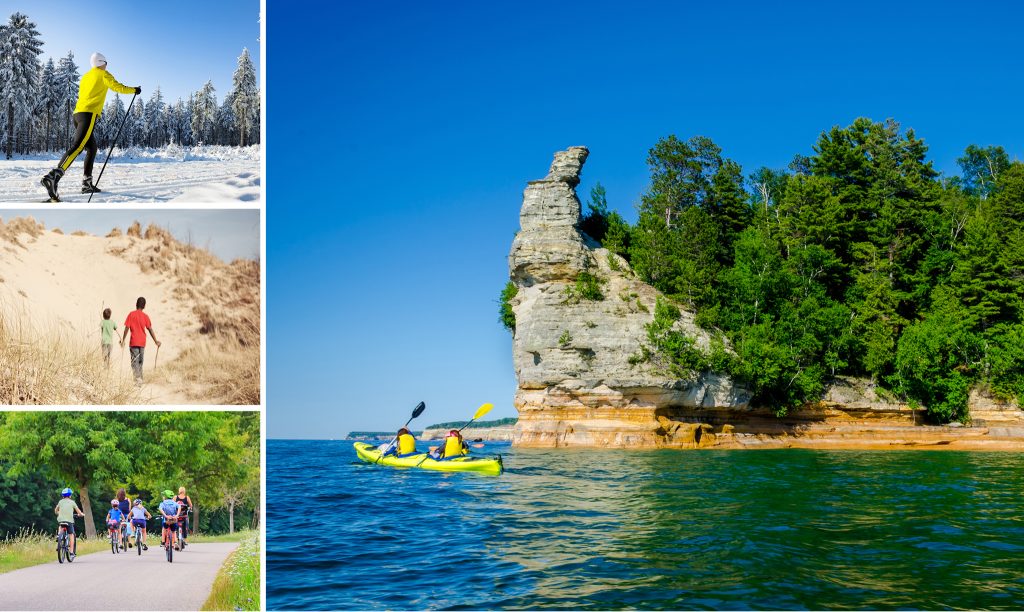In 2013 Utah was the first state to create an office of outdoor recreation. Today 14 states have established such agencies, and Michigan led the charge in the Midwest this May when Gov. Whitmer announced the Office of Outdoor Recreation Industry.
Working with the Department of Natural Resources (DNR) and the Michigan Economic Development Corp., this new office aims to anticipate emerging trends, create effective policy and elevate outdoor recreation opportunities and resources across Michigan. In addition, a group of manufacturers, retailers, service companies and conservation groups are forming an outdoor recreation industry alliance to complement the state’s efforts.
I’m really excited about these initiatives, and here’s why:
Entrepreneurship-led economic development — Michigan’s outdoor recreation industry currently generates more than $26 billion in consumer spending, 232,000 direct jobs and $2.1 billion in state and local tax revenue. Granted, these are nice numbers, but there’s opportunity for even greater impact, and encouraging entrepreneurs in this sector will be important. As they innovate new products and services for outdoor recreation, growth-oriented businesses will create jobs that attract and retain talent throughout the state.

Sustain and expand conservation efforts — Hunting and fishing have figured prominently among Michigan’s outdoor activities, with consumer spending generating more than $11 billion annually along with 171,000 jobs. What’s more, revenues from hunting and fishing licenses and surcharges have paid for most of DNR’s wildlife-management and habitat-preservation work. Yet in the last two decades, the number of hunters and anglers (predominately aging Baby Boomers) has decreased by 20%, and a continued decline in this base would dramatically affect dollars that preserve our state’s natural spaces. Promoting hunting and fishing to a younger and more diverse audience could help them remain an important part of Michigan’s economy and conservation support.
Yet it’s also important to look beyond hunting and fishing. Encouraging participation in other forms of outdoor recreation (hiking, kayaking, biking, etc.) will be important to draw more people — and dollars — into the conservation movement. It’s critical to put more effort behind protecting and improving our natural resources, and additional investment opportunities will come from expanded outdoor recreation.
Health and wellness — Among sobering statistics, more than 30% of Michigan’s adult population is currently obese (up from 22% in 2000 and 13% in 1990), and 27% of folks are physically inactive. We clearly need to be more mindful about health and wellness, and exercise is a powerful prescription. Indeed, a few years ago the DNR, Recreation and Park Association and Blue Cross Blue Shield launched an initiative to encourage outdoor activity called “MI Big Green Gym,” and I can’t think of a better metaphor for encouraging people to take advantage of our state’s natural areas.
Besides presenting opportunities for exercise, just spending time outdoors has some surprising physical benefits: reduced risk of type 2 diabetes and cardiovascular disease, improved sleep, and decreased levels of blood pressure and stress-related hormones like cortisol. Scientists have also shown that spending time in nature yields a wide array of mental benefits, from boosting memory and concentration to increasing creative capabilities. Even more good news: You don’t have to go to a national park. Pockets of green spaces in urban areas can deliver the same benefits.
Diversity, inclusion and equity — Many demographic and socioeconomic groups are underrepresented in outdoor recreation. Case in point, 78% of visitors to national parks are white, according to a recent National Park Service survey. There are a number of things that can be done to improve this scenario. For example, organizations and communities could:
- Hire a more diverse workforce (gender, race, ethnicity, LGBT, people with disabilities) and portray diversity in marketing efforts.
- Subsidize or offer free transportation and admission to outdoor recreational venues to help individuals with lower income levels.
- Establish events that target minorities could make them feel more welcome in parks and natural spaces.
- Increase the amount of green space in urban areas.
As we strive to expand outdoor recreation, it’s important to have a comprehensive strategy, one that allows us to prosper economically and also addresses conservation, health and social issues. Leveraging our state’s abundant natural resources through the intersection of these four pillars will increase quality of life for everyone — and make Michigan a better place to live, work and play.
Published 8/07/2019
